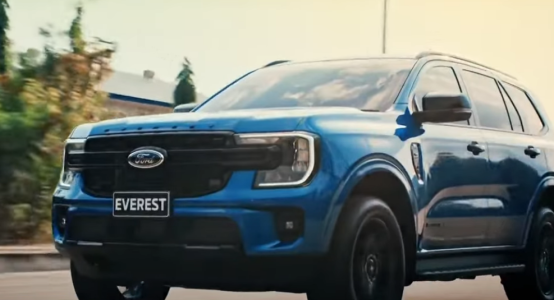Ford issues major engine recall—check if your vehicle is affected
By
Gian T
- Replies 3
If you or someone you know drives a vehicle, you must know some important news.
Ford Australia has just issued a major recall affecting over 13,000 vehicles across the country, and it could have serious safety implications for drivers and passengers alike.
One of the engine components may fail without warning, increasing the risk of a crash.
The recall targets explicitly Ford Ranger utes and Everest SUVs equipped with the 3.0-litre turbo-diesel V6 ‘Lion’ engine.
According to Ford, a manufacturing defect means the left-hand engine camshaft sprocket could fracture unexpectedly.
If this happens, the engine may stall without warning, leading to a sudden loss of power while driving.
As you can imagine, losing power in the middle of traffic or on the highway is inconvenient and downright dangerous.
Ford’s recall notice warns that this sudden loss of motive power increases the risk of an accident, which could result in serious injury or even death for vehicle occupants and other road users.
The recall covers 13,409 Ford Rangers and Everests built with the 3.0-litre V6 turbo-diesel engine.
If you’re unsure whether your vehicle is included, it’s best to check your registration papers or contact Ford directly for clarification.
If your car is part of the recall, Ford will contact you in writing with instructions.
You’ll be asked to book an appointment with an authorised Ford dealer, who will inspect and repair the issue free of charge.
It’s important not to ignore this notice—getting the repair done as soon as possible is the best way to keep yourself and others safe on the road.
If you have any questions or concerns, you can reach the Ford Customer Relationship Centre on 133 673 for more information.
A total of 13,490 vehicles manufactured between 2022 and 2025 are affected.
You can find the list of Vehicle Identification Numbers (VINs) here and the original recall notice attached here.
Vehicle recalls are more common than you might think, and they’re usually issued when a manufacturer discovers a safety-related defect.
While it can be worrying to hear your car is affected, it’s reassuring to know that manufacturers like Ford proactively address these issues before they lead to accidents.
If you receive a recall notice, don’t panic. The process is straightforward: contact your dealer, book your car, and let the professionals take care of the rest.
Repairs are always free of charge for recall-related issues.
To stay informed about vehicle recalls, regularly check your mail and email for notices from your car manufacturer.
You should also visit the official Ford Australia website or the Australian Government’s Product Safety Australia site to search for current recalls.
Even if your car appears to be running normally, don’t delay any recommended repairs, as hidden defects could lead to serious issues later.
Make sure your contact details are up to date with your dealer or manufacturer so you don’t miss any critical safety updates.
This recall is a timely reminder for all drivers—especially those of us in the over-60s community—to stay vigilant about vehicle safety.
Regular servicing, keeping an eye out for unusual noises or performance issues, and responding promptly to recall notices can make all the difference.
And if you know someone who drives a Ford Ranger or Everest, be sure to pass this information along. A quick conversation could prevent a serious accident.
Credit: YouTube

Have you ever experienced a vehicle recall before? Did you find the process straightforward, or were there any hiccups along the way? Share your stories and tips in the comments below.
Ford Australia has just issued a major recall affecting over 13,000 vehicles across the country, and it could have serious safety implications for drivers and passengers alike.
One of the engine components may fail without warning, increasing the risk of a crash.
The recall targets explicitly Ford Ranger utes and Everest SUVs equipped with the 3.0-litre turbo-diesel V6 ‘Lion’ engine.
According to Ford, a manufacturing defect means the left-hand engine camshaft sprocket could fracture unexpectedly.
If this happens, the engine may stall without warning, leading to a sudden loss of power while driving.
As you can imagine, losing power in the middle of traffic or on the highway is inconvenient and downright dangerous.
Ford’s recall notice warns that this sudden loss of motive power increases the risk of an accident, which could result in serious injury or even death for vehicle occupants and other road users.
The recall covers 13,409 Ford Rangers and Everests built with the 3.0-litre V6 turbo-diesel engine.
If you’re unsure whether your vehicle is included, it’s best to check your registration papers or contact Ford directly for clarification.
If your car is part of the recall, Ford will contact you in writing with instructions.
You’ll be asked to book an appointment with an authorised Ford dealer, who will inspect and repair the issue free of charge.
It’s important not to ignore this notice—getting the repair done as soon as possible is the best way to keep yourself and others safe on the road.
If you have any questions or concerns, you can reach the Ford Customer Relationship Centre on 133 673 for more information.
You can find the list of Vehicle Identification Numbers (VINs) here and the original recall notice attached here.
Vehicle recalls are more common than you might think, and they’re usually issued when a manufacturer discovers a safety-related defect.
While it can be worrying to hear your car is affected, it’s reassuring to know that manufacturers like Ford proactively address these issues before they lead to accidents.
If you receive a recall notice, don’t panic. The process is straightforward: contact your dealer, book your car, and let the professionals take care of the rest.
Repairs are always free of charge for recall-related issues.
To stay informed about vehicle recalls, regularly check your mail and email for notices from your car manufacturer.
You should also visit the official Ford Australia website or the Australian Government’s Product Safety Australia site to search for current recalls.
Even if your car appears to be running normally, don’t delay any recommended repairs, as hidden defects could lead to serious issues later.
Make sure your contact details are up to date with your dealer or manufacturer so you don’t miss any critical safety updates.
This recall is a timely reminder for all drivers—especially those of us in the over-60s community—to stay vigilant about vehicle safety.
Regular servicing, keeping an eye out for unusual noises or performance issues, and responding promptly to recall notices can make all the difference.
And if you know someone who drives a Ford Ranger or Everest, be sure to pass this information along. A quick conversation could prevent a serious accident.
Credit: YouTube
Key Takeaways
- Ford Australia is recalling 13,409 Ranger utes and Everest SUVs due to a potential engine defect.
- The affected vehicles have the 3.0-litre turbo-diesel V6 ‘Lion’ engine, in which a manufacturing fault may cause the left-hand engine camshaft sprocket to fracture.
- This defect could lead to a sudden engine stall and a loss of motive power while driving, increasing the risk of an accident.
- Owners of impacted vehicles will be contacted and should make an appointment with an authorised Ford dealer to have the issue fixed free of charge.








